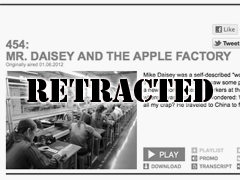One of the big buzzes this week is radio/podcast show This American Life’s episode Retraction, documenting the errors of their previous episode about China’s suppliers to Apple, called Mr. Daisey and the Apple Factory.
As I listened to Retraction, I couldn’t stop this feeling of deja vu … that I’ve seen these same mistakes made in B2B.
I listened to Retraction, I couldn’t stop this feeling of deja vu … that I’ve seen these same mistakes made in B2B.
In essence, TAL took a story that was already being presented for monologue, and reproduced it for their show. Mistakes made include:
- Working with someone outside their group
- Not getting primary content or research
- Assuming things that can’t be checked out are okay.
- Relying on email communications
But their biggest failure was this:
- Trying to fit a ‘theatrical’ story into a ‘journalistic’ story.
- And not realizing how much more work (or what work) needed to be done to do this.
In B2B sales, we often have to fit our product to suit the customer’s need. That’s okay up to a point, and I’m sure you’ve been there. The company struggles a bit, the order runs late, but ultimately the customer gets what they wanted, and your company learns something new.
But sometimes the solution for the customer is outside what your company should be doing. The opportunity can overshodow your objective opinion of how your company can deliver on this order. It’s a big new customer, or a potential new market, or a potential huge margin.
You might not know it at the time you accepted the order, but as your ship time slips and rework cost accumulate, or your engineering manager is flying out to the job site, everyone at the company regrets accepting the order. (And yes, the salesperson is the one blamed.)
Dang it though, in business you can’t just issue a retraction and be done with it. The problem festers until it is resolved.
Hopefully, like Ira Glass, you learn something from this painful process. No, not hopefully. You must learn one of two things from such a poor decision:
- We now know how to handle orders like this
- We now know to avoid orders like this
This is how B2B companies grow. It is painful, but important.
I might even squeeze in a comment that Apple itself is probably so successful because it has gone thru this process so much, it becomes a habit. I’ll leave further commentary to the business pundits who always use Apple as case study. I’ll stick to using This American Life as my example.
